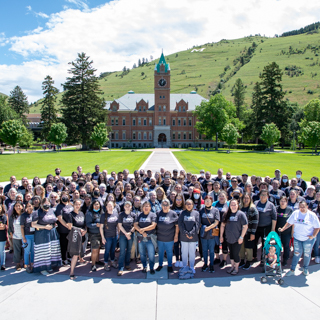08. Documenting the Language of Landscape
This workshop will provide participants with basic knowledge and experience on how to incorporate the documentation of landscape into their work.
In particular, we will provide a general overview for incorporating different methods for studying and documenting the landscape and territory. The workshop begins with a general overview of landscape and language work, as well as discussion of why incorporating landscape into a language documentation project is valuable. Broadly speaking, we will focus on two different types of methods: ones that involve in-place interaction with the land (e.g., landscape walks, landscape diagramming, in-situ place recording) and ones that are not necessarily in-place (e.g., using digital and/or analogue maps, landscape or place name narratives, interviews). In order to more thoroughly understand these types of methods, we will have two sessions that focus on putting them into practice in the campus setting. We plan on arranging for enrolled Montana participants to participate as guides for a place-based walk and we will also provide some basic material to work with non-place-based material to simulate what these different experiences are like, as well as to provide more interactive learning opportunities.
Landscape is an ideal area for exploring the deep connections people have with the place(s) they inhabit and visit, specifically in the case of groups of people who have lived in the same area over long periods of time. This intimate knowledge of the landscape can be reflected in different parts of language including at the lexical level, including specific verbs used to describe movement, highly specific classification of different land types that can be expressed in nouns, extensive place naming practices, or even in expressions used to instantiate angular systems for locating objects that are based on landscape entities such as mountains, rivers or systems based on gradients found in the landscape such as uphill / downhill or in-island / out-island. Such language can be explored in a particular place or even in narratives about places, travels through places or the location of different camps, villages or areas of interest.
People also experience the land in different ways, something that can only be observed in-situ. In particular, sensorial perception can be observed and explored in landscape walks and language related to such perceptual experiences can also be documented to better understand the perceptual properties of different places. Additionally, personal narratives and memories play an important role in the study of landscape. Such topics can be studied in-situ through recordings made during landscape walks or recordings made at particular places or they can be explored without visiting the place being described, specifically through landscape narratives.
Workshop Content
Day 1 -- General introduction of workshop and overview of different methods for studying and documenting the landscape: a) landscape walks in-situ (place-based), b) using maps and other resources (digital and analogue) to interact with landscape from a distance.
Day 2 -- Working inside with digital and analogue material (landscape narratives, video and audio interviews, paper maps, digital maps), representing place and territory through mapping exercises. Brief discussion of planning workshops and processing information -- what to do in advance and what to do afterwards, overview of types of equipment that could be useful
Day 3 -- Getting outside to practice some of the methods -- taking a landscape walk on campus
Day 4 -- Final reflections and discussion of additional case studies, methods and ways to study the landscape, as well as some potential pitfalls of certain approaches
Participants in this workshop will acquire an understanding of how to document landscape related knowledge as part of a larger language documentation project and will have a better appreciation for the multifaceted approaches that can be taken while studying landscape and territory. In particular, we hope to provide participants with the basis for organizing and facilitating landscape walks, as well as the basic skills for using existing digital and analogue maps and texts for landscape based inquiry. The bibliography provided as part of this workshop will serve as a source of consultation that participants can use after the workshop has ended, with different case studies and general reference material to explore in more detail.
Materials
It would be helpful for participants to have a laptop or share with a fellow participant.
Facilitation Team
Time and Location
- Week
- Period
- Location
